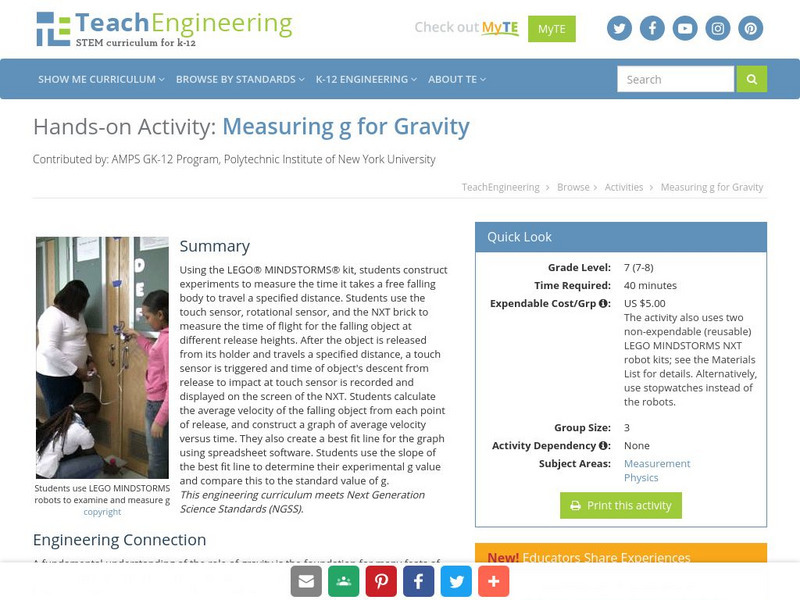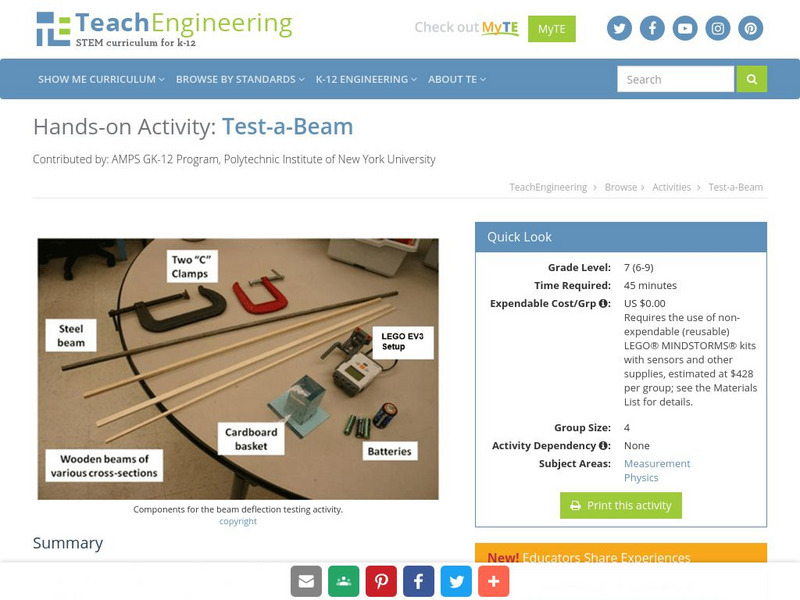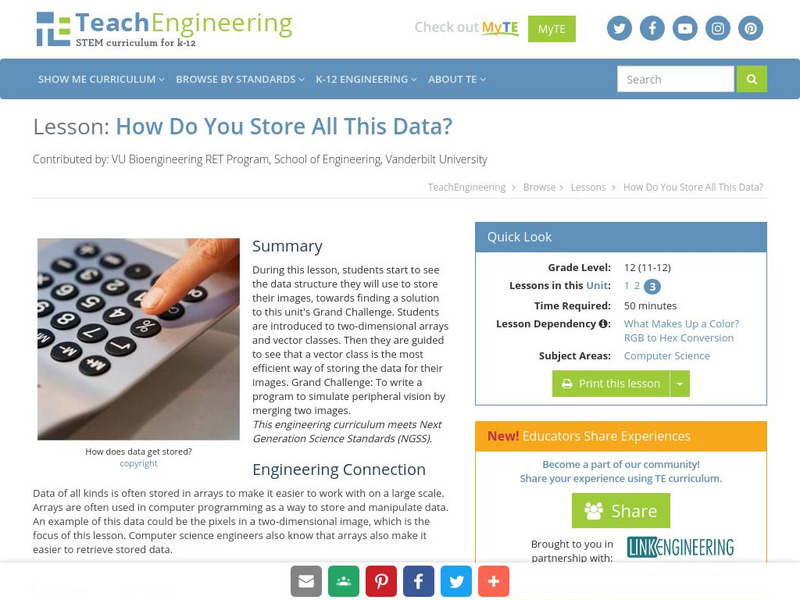Hi, what do you want to do?
TeachEngineering
Teach Engineering: Measuring G
Using the LEGO MINDSTORMS NXT kit, students construct experiments to measure the time it takes a free falling body to travel a specified distance. Students use the touch sensor, rotational sensor, and the NXT brick to measure the time of...
NASA
Nasa: Great Images in Nasa
Fascinating collection of images from NASA, chosen for their historical or aesthetic significance. Images are searchable by subject, by NASA center, and by keyword, and each is available in three sizes. With links to more information...
TeachEngineering
Teach Engineering: Test a Beam
Students measure different types of small-sized beams and calculate their respective moments of inertia. They compare their calculations to how much the beams bend when loads are placed on them, gaining insight into the ideal geometry...
TeachEngineering
Teach Engineering: How Do You Store All This Data?
During this lesson, students start to see the data structure they will use to store their images, towards finding a solution to this unit's Grand Challenge. Students are introduced to two-dimensional arrays and vector classes. Then they...
TeachEngineering
Teach Engineering: The Claw
Students learn about gear ratios and power by operating toy mechanical cranes of differing gear ratios. They attempt to pick up objects with various masses to witness how much power must be applied to the system to oppose the force of...
Khan Academy
Khan Academy: Bonus Points
A place to share and see others' ideas for improving a lego robotics project, light guitar.
Curated OER
Robots 1
Explore the world where robotics engineers at NASA's Ames Research Center design, build and test robots used for missions in space. This site also provides an integrated math and science lesson. [5 mins, 35 secs]
Curated OER
Robots 3
Explore the world where robotics engineers at NASA's Ames Research Center design, build and test robots used for missions in space. This site also provides an integrated math and science lesson. [5 mins, 35 secs]
Curated OER
Robots 5
Explore the world where robotics engineers at NASA's Ames Research Center design, build and test robots used for missions in space. This site also provides an integrated math and science lesson. [5 mins, 35 secs]
Curated OER
Robots 2
A video introduction to robotics engineers at NASA's Ames Research Center who design, build, and test robots used for missions in space. This site also provides an integrated math and science lesson that addresses the topics of...
TeachEngineering
Teach Engineering: Mission to Mars
The Mission to Mars curricular unit introduces students to Mars-the Red Planet. Students discover why scientists are so interested in studying this mysterious planet. Many interesting facts about Mars are revealed, and the history of...
Other
Exploring Computer Science: Scope and Sequence
Exploring Computer Science is one year course consisting of six, six week long units. The course was developed around a framework of both computer science content and computational practice where assignments and instruction are...
Curated OER
Science Kids: Science Images: Aibo Robot Dog
This is a side on image of the popular robot dog known as AIBO (standing for Artificially Intelligent Robot). Built by Sony, AIBO is capable of displaying emotions and can perform a large number of voice activated commands including...
Curated OER
Reliable Robots
Explore the world where robotics engineers at NASA's Ames Research Center design, build and test robots used for missions in space. This site also provides an integrated math and science lesson. [5 mins, 35 secs]
Khan Academy
Khan Academy: Start: Welcome to Crowds!
Welcome to Crowds: In this topic we'll explore how swarms of robots were created for WALL-E using combinatorics. Two lessons: Building Crowds, grades 4-7 and Counting Crowds, grades 9-12.
Other
Samuel Centre: Effects of Technological Innovations on Social Interactions
This article from the Samuel Centre for Social Connectedness discusses how technology has altered humans' interactions in their daily lives. Machines and automation have replaced our interactions with service people. It looks at the...
Penguin Publishing
Penguin Random House: Doug Unplugged by Dan Yaccarino
This is an introduction to the children's novel Doug Unplugged by Dan Yaccarino, a science fiction book for young readers. It includes a brief summary, links to about the author information, book reviews, and other books by the author....
PBS
Pbs: Nova: Anatomy of a Space Rover
Take a closer look at the space robots Spirit and Opportunity, and their scientific instruments used for exploring the surface of Mars.
PBS
Pbs Learning Media: Makers: Collection
The Maker Party, an initiative in which people around the world meet up, learn to make things, and share what they've made online. This collection is designed to support the Maker Party by providing a one-stop shop of STEM and digital...
Other
Sprk: Orb Basic Lesson 2 [Pdf]
Students will use Sphero to explore the computer science concepts of variables and conditionals (ifstatements). They will use OrbBasic, which is a text-based programming language for the Sphero. They will write a simple program that...
Other
Sprk: Sphero Chariot Stem Challenge [Pdf]
SPRK STEM challenges are fun, interactive activities that challenge students to use creativity and team-work to move through simple steps of the design process in order to build Sphero-based creations. In this challenge, there are...
Other
Sprk: Macro Lab Lesson 4 Percentages: Teacher Guide [Pdf]
Students will use Sphero to explore percentages using speed and color. The speed experiments are quantitative and the color experiments are qualitative. They will program the Sphero to move at 100% speed for a particular amount of time,...
Other
Sprk: Orb Basic Lesson 3 [Pdf]
Students will use Sphero to explore the computer science concepts of reading sensors and storing data in variables. They will use OrbBasic, which is a text-based programming language for the Sphero.They will write a simple program that...
Other
Sprk: Time, Speed, and Distance:teacher Guide [Pdf]
Students will use Sphero to show that there is a linear relationship between time, speed, and distance. They will program Sphero to move at a particular speed for a particular amount of time, and then measure how far it has gone.They...














